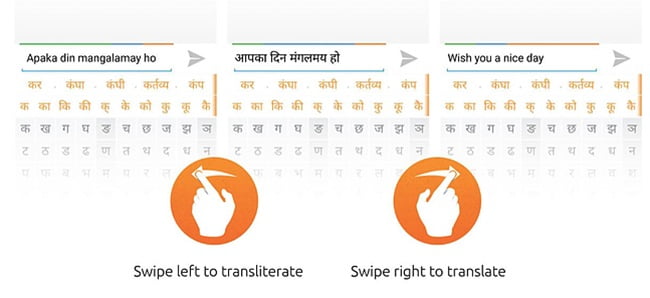
Mr. Patel (name changed to protect privacy), a businessman from Jamnagar in Gujarat, works in the garment business. He has business partners in Australia and manufacturers in China. But Mr. Patel and his colleagues are not well-versed in English. This makes it difficult for them to communicate with their clients overseas. He has to hire a person just to handle emails and conduct business with his partners. The problem with this scenario is that it makes the entire company dependent on this one person.
Mr. Patel’s saviour has turned out to be Indus OS, a phone operating system that supports 12 Indian languages. According to Rakesh Deshmukh, one of the co-founders and CEO of Indus, Mr. Patel is now a client of his company and has bought 10 phones run on the Indus OS and distributed them among his employees.
His team now types emails in Gujarati and Indus translates them to English before sending, doing the same in reverse for the emails they receive.

“When I came to know that someone in Gujarat had bought 10 phones during our pilot launch, I went to visit him personally. He told me there had been a huge shift in his business because of the phones and how they had made communication easy,” says Rakesh.
The Indus OS is available on a range of smartphone and is pre-loaded on select models of partner brands like Micromax, Celkon, Karbonn, Intex, and Swipe.
You may also like: Three Techies in Chennai Have Made It Possible for Students to Learn Programming in Indian Languages
Three IIT graduates, Rakesh Deshmukh, Akash Dongre and Sudhir B founded the company in 2013 because they saw a big gap in the Indian market for languages in mobile technology.

“When analysing the ecosystem of languages available in mobile technology, we observed that smartphones featuring Indian languages support only the menu text – not the complete experience for users who expect a lot more like the ability to write emails and play games,” says Rakesh. “We wanted to develop something that would help even those people who are using the internet on smartphones for the first time. The operating system being the most important in any mobile device, we decided to make it much better and more powerful.” This is the major reason why they started building a new operating system from scratch.
The trio launched a pilot version of the phone in Gujarat in 2014 to test how people would respond. After selling over 5,000 handsets they decided to expand to other parts of the country and to other languages too.
The Indus OS supports local Indian languages with a clean and clear interface and makes it easy for first-time users to operate the phone. Some of the features include the following:

• Default applications in the selected language.
• Custom-built features like phone dialler and SMS in that language.
• A hybrid keypad that users can use to type in two languages.
• Swipe to translate between English and regional language, which means that the user has to put a finger on the text and swipe to one side – and it automatically gets translated.
• Text to speech conversion in regional languages.
• Auto-correct option in all languages.
• Free text messaging between users of the Indus OS.
Like the Google Play Store that is installed on Android phones, Indus comes with an app store called App Bazaar. It has over 30,000 applications in select languages. According to Rakesh, many developers cooperated with the team to ensure that users have access to some of the most important apps.
You may also like: Two Men from the US Are Helping Dairy Farmers in Rural India Keep Milk Chilled without Electricity
Today, Indus has over 4.5 million users across India. It is available on 14 models of phones available in the market, priced between Rs. 3,000 and Rs. 10,000.

“It was a roller coaster ride at first. It was fascinating to see that there were so many people for whom we had to build something,” says Rakesh, who graduated in 2006 and has worked in the field of mobile technology since then. “But it was a complex process because something like this had not been done before,” he says.
Rakesh recalls the day Mr. Patel, the businessman from Gujarat, came to their office and told them, “Whatever happens, you must continue with this company because it has changed the way we run our business.” It was a big boost for Rakesh and his team. “It also made us believe that what we were doing was impacting the lives of people in some way or the other,” concludes Rakesh.
[Source:-The Better India]





